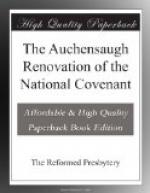2. This duty must be gone about with sincerity and uprightness of heart; thus Joshua, when making a covenant with the people, that they should serve the Lord, exhorts them—“Now therefore fear the Lord, and serve him in sincerity and truth,” Joshua, xxiv., compare the 25th verse with the 14th. The want of which qualification in covenant-renewing, causes unsteadfastness and perfidy in covenant-performing—Psal. lxxviii. 36, 37.
3. This duty of covenant-renewing requires, as a qualification towards the right performing of it, that there be a due consideration, and some suitable impression of the solemnity and weightiness of the work: which ariseth, partly from the object or party covenanted with, the holy and jealous God, Joshua xxiv. 19—“He is a holy God, he is a jealous God, he will not forgive your transgressions, nor your sins,” and partly from the subject matter covenanted, or engaged to. The articles of the covenant of grace, which we have professedly, at last, yielded to in our baptism, are weighty; for therein, as God engages to give us himself, his Son Christ Jesus, and in him all temporal and eternal blessings; so we engaged to be obedient children, and faithful subjects to him all the days of our lives. And the articles of these national covenants are weighty, for therein we engage to great things relating to the glory of God, and the good of our own and other’s souls. And, partly, this weightiness ariseth from the great danger and dreadful punishment of breaking the covenant; which is threatened in many places of Scripture. The same is also intimated to us in the customs both of the Jews and Heathens, in entering into covenant; particularly, we find that the Jews used to cut a calf, or some other clean beast, in twain, and pass between the parts of it—using this, or the like form of speech, as the Jewish doctors relate—“So God divide or separate me, if I keep not this covenant.” Jer. xxxiv. 18, compared with verse 20—“I will give the men into the hands of their enemies who have transgressed my covenant, which they had made before me, when they cut the calf in twain, and passed between the parts thereof.” Nehemiah also, chap. v. 12, 13, when he took an oath of the priests, shook his lap and said—“So God shake out every man from his house, and from his labour, that performeth not this promise,” &c. And all the covenanters said—“Amen.”
4. Much tenderness and heart-melting is requisite to the right performing of this duty. So it was with covenant-renewing Israel and Judah, who were “weeping as they went to seek the Lord their God, and to make a covenant never to be forgotten.” This brokenness of heart, and tender-melting frame may arise, both from the consideration of the many sins and iniquities whereby persons have provoked the Lord their God to anger, whence they come “to be like doves of the valley, every one mourning for his iniquity:” and likewise from the consideration




